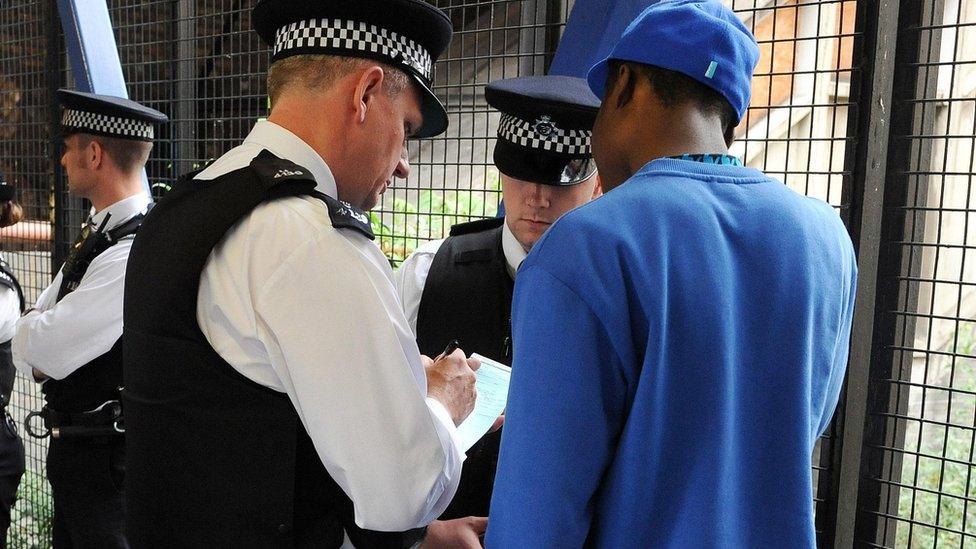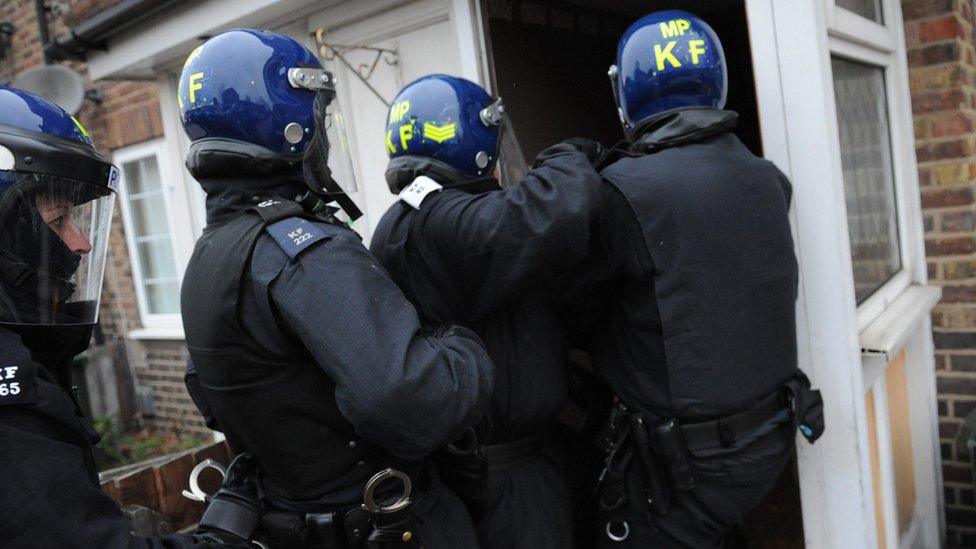Met Police's gangs database shared victims' data - watchdog
- Published

The data protection watchdog says the Metropolitan Police's database of gang members has been illegally sharing information on hundreds of victims who aren't involved in gang crimes.
The workings of the database - called the gangs matrix - is also potentially racially discriminatory, the Information Commissioner's Office said.
The database was created to gather intelligence on about 3,400 suspects.
The Met says it has accepted the findings and is overhauling the matrix.
The gangs matrix was created after the 2011 riots - but the the Information Commissioner's Office (ICO) said it had been so poorly managed since its inception that it constantly failed to properly differentiate between dangerous offenders and their victims.
As a result, police were sharing information with other agencies, without fully explaining who on the secret lists posed a serious risk of crime.
The ICO has served Scotland Yard with its toughest sanction short of a criminal prosecution, ordering the force to overhaul how it manages and shares the data.
It stopped short of ordering the force to close down the database because it said it recognised its value if managed properly.
Police and officials in each of London's 32 boroughs collect and manage a local database that feeds into the London-wide Gangs Matrix system.
The database includes personal details, criminal records, intelligence on links to gun or knife violence and a rating of how dangerous each individual is thought to be.
In the last year it has played a key role in solving a wide range of serious crimes in London.
Figures from the Mayor of London show that a fifth of murder victims in the first nine months of 2018 were already on the database. Almost half of suspects charged in relation to 100 killings in the capital were also in the system.
'Potential discrimination issues'
But in a highly critical enforcement notice, external, the watchdog disclosed that the matrix was holding information on "a considerable number" of people who had "a risk score of zero".
"Their personal data continues to be processed as though they remained connected with gangs," said the watchdog.
"Their personal data and supposed association is shared with third parties... to encourage enforcement against them."

This sharing with agencies such as social services, housing authorities and education was part of an "Al Capone" attempt to disrupt gang members by targeting them for lesser matters.
But the agencies receiving the information did not know that some of the people were in fact merely repeat victims or associates of more serious gang members.
That meant sharing the information would have a "significant adverse impact" on people who would be wrongly labelled as gang criminals by anyone receiving the information.
James Dipple-Johnstone, the deputy information commissioner, said the way the Met handled highly sensitive data that needed protecting was quite confused.
"In some circumstances there was good practice, but in the poor, it wasn't always clear that people were on there by virtue of that victim status - or how they were linked in with the crime and the gangs," he told the BBC.
"Potentially, depending on who was receiving that information, it would have influenced their opportunity to access education opportunities, training opportunities, social services and housing opportunities."
Almost nine out of 10 individuals on the database are from a black or other ethnic minority background and the ICO warned this raised "potential issues of discrimination", given how the information was used and the fact that Scotland Yard had not considered this risk.
Deputy Assistant Commissioner Duncan Ball of the Metropolitan Police said the force had accepted the watchdog's findings and was "working hard" to overhaul the database in line with the enforcement order.
"There is clear evidence that the gangs matrix can help to reduce offending and serious violence on the streets of London," he said.
"We have already started work to ensure that we improve our data handling and information sharing with partners, who are also involved in community safety work.
"As well as addressing the concerns within the ICO report, we are also taking forward additional work including the introduction of a public facing website to explain the legal framework for the gangs matrix and further information to improve public confidence and transparency."
- Published24 May 2018

- Published9 May 2018

- Published28 August 2018

- Published16 August 2018

- Published6 June 2018

- Published1 June 2018
